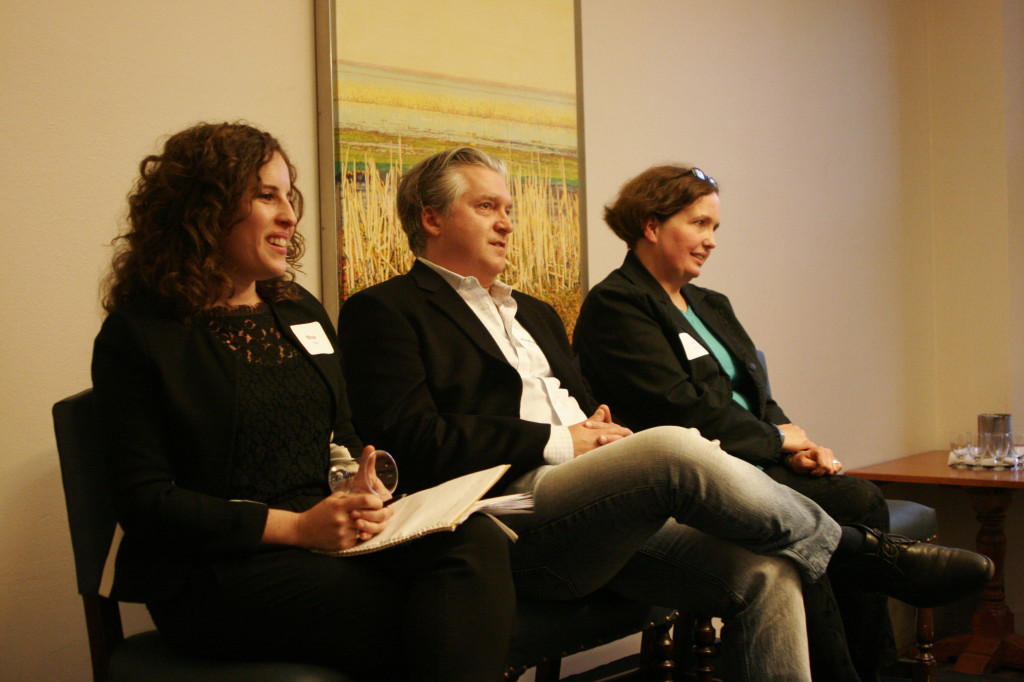Life’s a pitch (but freelancers together are stronger)
It was a packed house last night for the freelance panel discussion, “Yes We Are Worthy: Making it in the freelance world.”
At the event on the University of Toronto campus, a roomful of freelancers swapped business cards and battle stories. We also received some sound advice from the panelists: writers Ann Douglas and Andrew Clark and media researcher Nicole Cohen.
For those of you who couldn’t be there (or were busy live-tweeting the highlights and missed a few points) here’s a summary of some of the things we heard.
Longtime freelancer Andrew Clark (“I predate the wheel,” he quipped) offered some insights from his early days of freelancing, when he sold his first story by sliding a submission under an editor’s door. In the pre-internet age, said Clark, the need to hand-deliver queries and stories offered the advantage of putting freelancers face-to-face with editors, giving them the chance to pitch more ideas.
“I never left without a story,” he said, adding “sometimes I think they gave me a story to get me to leave.”
Clark’s advice: Pitch on paper. Write a letter to an editor. “They don’t get many of those.” Make a connection with your editors. Take them for coffee even though they’re busy. Find out when they’re not on deadline. That way, he said, when it’s Survivor: Freelance Edition, they’re more likely to keep you instead the faceless others who they’ve only heard from via email. Clark also suggested that freelancers need to have “a little bit of a cowboy mentality.” Go out and do your own thing: start a magazine, attract followers with your writing. And if possible, he said, think about getting an agent.
Last winter Ann Douglas ignited freelancer outrage (and received an avalanche of freelancer support) with her post detailing why she could longer write for the Toronto Star. She told the crowd she had expected the Star to negotiate with her since the paper was founded on the Atkinson Principles. She confessed to being a little heartbroken at having to give up her column when she was told the contract was non-negotiable.
Douglas’s advice: Just because the low pay/no pay model of publishing has become popular in the past few years, she said, it doesn’t mean freelancers have to roll over and play dead. “This is our moment,” she said. “We as freelancers can stand together and remind the public that there is value in our work. But first we have to value it ourselves.” Douglas said it’s empowering to walk away from bad contracts. You take control of your working conditions and gain the respect of your peers. “You know you haven’t made things worse for the next writer that comes along,” she said. “Imagine what a difference we could make as a group if each person in this room decided to take that approach. Just imagine.”
Nicole Cohen is an assistant professor at the U of T Missisauga and a researcher of cultural and media labour. She pointed out that more media outlets and forms exist now than ever before. So why, she asked, is it so hard for freelancers to earn a living?
As publishers have grown larger, said Cohen, they’ve offloaded the uncertainty of publishing onto the writers. That means lower rates and copyright-grabbing contracts. Cohen’s research has demonstrated that, although we freelancers love the work we do (the word “freedom” appeared 100 times in responses to a survey she conducted on freelancers’ working conditions), our material conditions are declining. Half of the respondents to her survey reported earning less than $20,000 per year. Persistent stress and frustration at having to chase down payments were frequent complaints. As one of the survey respondents noted: for freelancers, “life’s a pitch.”
Cohen’s advice: Noxious contracts have become a flashpoint for freelancers to unite around. “Freelancers are finding that when they come together their voices are louder,” she said. There are freelance organizations and resources springing up worldwide — from the U.S., to Europe, to Australia. Freelancer organizations are advocating for their members and winning battles. “The best way to make it in the freelance world, history and recent history suggests, is together and not alone.”
You can check out more of the discussion from last night’s event on Twitter by searching the #cmgfreelance hashtag. And we’ll gather some of those tweets together into a post for you to read right here later this week.




